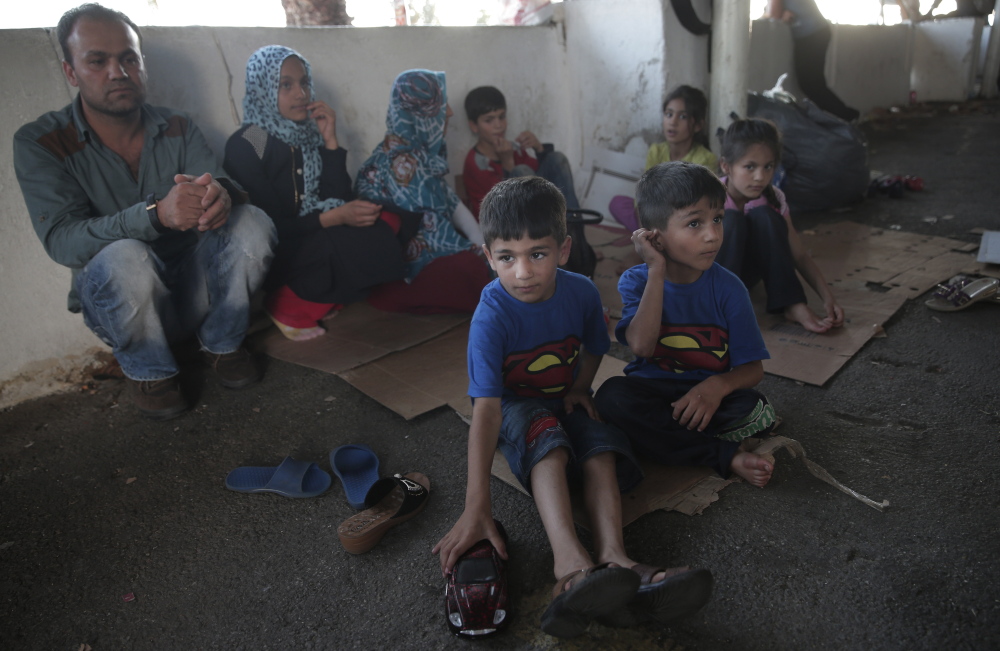BODRUM, Turkey — Suddenly, almost silently, a group of young men carrying a small plastic dinghy emerges from the darkness, dashes across a road and a dirty strip of sand and plunges into the crystal-clear waters of the Aegean Sea.
With the lights of the Greek island of Kos twinkling through the darkness – beacons of hope for a new and better life – another group of migrants has set off to make a risky – but less risky than most – sea crossing and apply for asylum in Europe.
The city of Bodrum, a magnet for wealthy tourists from Turkey and around the world, is these days drawing plenty of other visitors – migrants fleeing conflicts in the Middle East and Africa and seeking a better life in Europe, a continent so close they can almost reach out and touch it from the Bodrum peninsula’s many beaches. At its closest point, Kos is only 2.5 miles from Turkey.
Migrants, mostly from Syria, but also from Afghanistan, Iran and African nations often try to cross from the secluded beaches of Bodrum peninsula in groups upward of eight people in inflatable plastic boats meant for a maximum of four, powered by tiny electric outboard motors and plastic paddles.
Mohammad Ali, a 36-year-old Syrian law graduate who was a merchant in the town of Idlib before fleeing, is waiting in the park with his wife, two young sons and other family members for a second attempt to flee to Europe.
They abandoned their first crossing after a smuggler who promised a boat with eight people on board instead tried to cram in 16.
“It was about to sink. I was afraid of drowning so I decided to turn back,” he said.
While tourists eat and drink at Bodrum’s upscale waterfront restaurants, migrants carrying their meager belongings in backpacks sit across the street under palm and eucalyptus trees close to huge yachts moored in Bodrum’s harbor. There they wait to be taken to a remote beach before they are packed into tiny dinghies for the short crossing across a waterway also plied by giant oil tankers, tourist pleasure cruisers and coast guards.
Kenan Karsanbar, sitting on the shaded deck of a yacht moored in Bodrum’s harbor, looked out over small knots of migrants who were also trying to escape the searing heat of the midday sun in the shadows of eucalyptus trees. He said he feared for their safety making the crossing.
“It is dangerous even for four people (in such a small boat) – for 15 people, it is 100 percent dangerous.”
Many of the migrants seen setting off for Greece by an Associated Press team watching dead-of-night departures used a type of boat that can be ordered online for around 100 euros. The small electric motors cost more, but with smugglers charging around $1,200 per passenger –according to migrants – it is a lucrative illicit trade.
Smugglers seen organizing the departures from Fenerburnu beach refused to speak to reporters about their trade.
A Turkish government official said that the human smugglers have turned to the Aegean in the past year using inflatable boats he called Zodiacs, after patrols increased on popular migrant routes across the Mediterranean.
“The Aegean is a lot easier. All they need is a Zodiac boat and they are on an island in half an hour,” the official said on condition of anonymity in line with government rules that bar civil servants from speaking to journalists without prior authorization.
That quick crossing is easier and safer than longer crossings organized from North African nations like Libya to Italy.
Underscoring the risks, at least 40 migrants died Saturday in the hold of an overcrowded smuggling boat in the Mediterranean Sea north of Libya, apparently killed by fuel fumes. Some 320 others aboard were saved by the Italian navy, the rescue ship’s commander said.
Send questions/comments to the editors.



Success. Please wait for the page to reload. If the page does not reload within 5 seconds, please refresh the page.
Enter your email and password to access comments.
Hi, to comment on stories you must . This profile is in addition to your subscription and website login.
Already have a commenting profile? .
Invalid username/password.
Please check your email to confirm and complete your registration.
Only subscribers are eligible to post comments. Please subscribe or login first for digital access. Here’s why.
Use the form below to reset your password. When you've submitted your account email, we will send an email with a reset code.